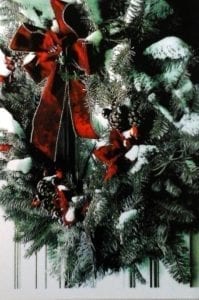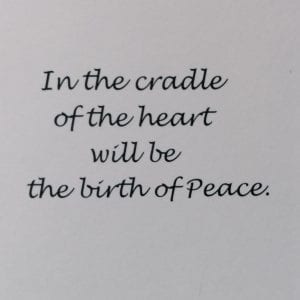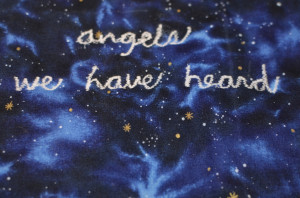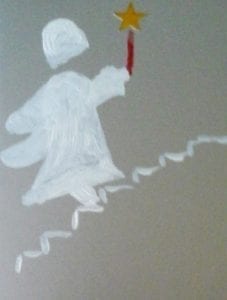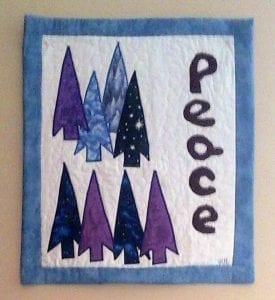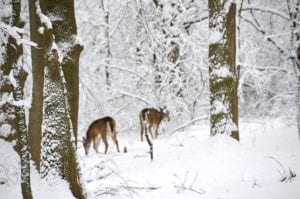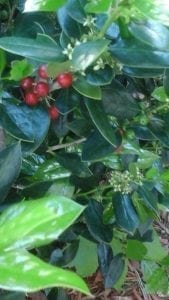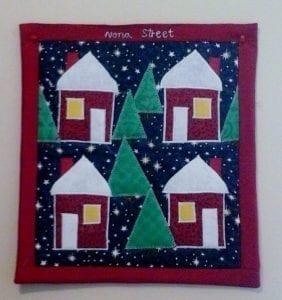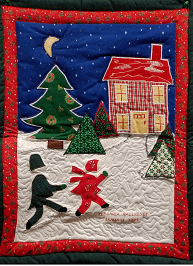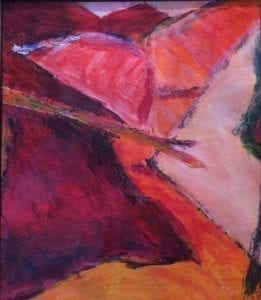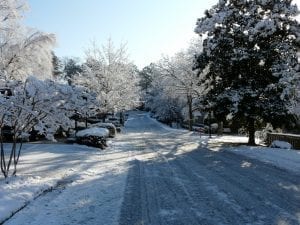From my heart to yours, I send my Christmas message. In this holiest of seasons, where the desire for peace nudges all hearts no matter their persuasion, let us give way to these highest and best of all emotions and act upon them. By acting upon them until they are second nature to us, in time they will be what they were meant to be; peace as natural as breath to life. Blessings, Veronica
-
Do You Hear?. . . .
Do You Hear?
Do I have more minutes to finish? There was no time for answers because the little one with a dash was out of sight. In a few minutes he was back and announced, I finish. Having learned to wait while private things were finished, I waited again while he proceeded to his room.
I followed him shortly to find him in pajamas and ready to crawl into the high bed. Well, should it be a story to tell or a story to read I asked. I am ready for you to choose. Tell me what it is we should do to get you ready for sleep? And I waited. Minutes ticked away while the choice was being made. Patiently, again, what will it be?
His face took on a faraway look as if searching for a memory. I recognized the look and wondered where he would go for that memory to take shape. I knew it well. It was a look that had been on my face many times with voices telling me to stop dreaming. I needed to pay attention to what was at hand and not waste so much time dreaming. So because of those reprimanding voices, I knew to wait.
He asked if I would sing the one I singed when I singed with other voices. He knowed that song!
What song is that? I wondered. There was no time for me to sing with other voices that he would have heard. Like this, he said and in his high soprano he sang his Gllloooooooooorrrrrrriiiiiiiiiaaaaaaaa and I knew. Unbelievably I knew. The music hung on his tongue and in his throat as if he were tasting a delicate sweet.
When did you ever hear me sing that? I asked. Before I came to you, he said. Before I came. I heard you singed and my heart singed with you. I knowed I could tell you some time if I just ‘membered it. I promised I would ‘member so I could hear it again and again. I knowed that you would ‘member if I singed it. And you do! he said, you do!
And I believed him because I gave up choir when he was due to be born. I took this child into my arms and sang the song he so wondrously remembered. And when I came to the part he remembered his voice faithfully shadowed mine. And another posit was added to the Memory Bank but who would believe it? Who?????? Except the many someones who entered their place of belief every time they bent their knees.
Those are the who. . . .

-
Beneath The Wings . . .
Being the child that I was, rooted in memory solidly, I could not help being a trial to my mother. Having seven other children of normal vintage , she could compare easily and wonder loudly why I had to be different. It was not by intent but by inclination of the tree. I always felt that had there been a way to send me back , she would have .
Because of memory, I could not dismiss the metaphysical. It had come with a high cost. As I grew, the religious took a sidebar while the spiritual became the most important. And because I was in the physical world and had to toe the mark, the secular had to be wedded within. So in effect, I had created a trinity . The metaphysical, the spiritual and the secular as a model for physical life.
I had embraced all elements and had thrown out nothing. It was all inclusive and broadly focused . Where we are is where we are. We are a product of our experience, a talented composition of memories and a host to our lives.
It is imperative that we honor what we have been taught and what is life giving and life sustaining . It is crucial to the enlightenment of civilization that we honor the growth of the individuals and their desire to make a difference . Each generation comes with a new found enthusiasm to promote the evolution of humankind.
It is up to us, the elders to support and be the hammock to cushion this growth. We should welcome this with joy. Let us not fail them.
We will talk of philosophy and we will talk of poetry. We will talk of people and Beings.
And we will again grace the lovely work of the Great God and say we walk beneath the wings of Him who holds us together.

-
The Power Within . . .
The power to change the world begins with the intention and the desire to change ourselves . We must become the person we want someone else to be.
We want the compassion , the love, the intelligence , the strength, the ability to see the larger picture, to see what they see and at least what we see. And how it influences everything, not only tomorrow but a million tomorrows. How the tree falls in our yard, or the one we plant will determine the air quality, the appearance , and the health of everyone in its path. Everything depends on what happens today . What is said today to beloveds will determine what man says to the angels eons down the line.
We work toward this. We want to meet this someone in our lives, who would hold the sacred history with tenderness forever. Need a god to do that? He abides within Man already. The divine is within. We must let our behavior reflect it.

-
Actions Are Stone . . .
Do not be swayed by tears which well and have no basis in words of the person when actions pronounce another philosophy . We can always well into tears but our actions will betray us.
*****
Do not accept apology for inadequate behavior when nothing is done to correct it. Apologizing does not relinquish responsibility.
*****
We know that beneath the exterior of those who have access to power runs amuck the feeling that power is equal to love.
*****
Power which senses out weakness uses that weakness to fortify their positions.
*****
Reconciliation is a mighty word and a hard act. It means forgiving not in the areas that are seen but in the feelings that are unmet.
*****
You cannot break a will which heralds its own functioning and its own existence .
*****
What we want is the educated mind which will carry the argument complete with commitment and put priority on that which will sustain humankind.

-
A Blessed World. . .
With my life long lack of physical prowess , it is with despair I faced getting from one place to another . Long plane rides always had me looking for either a pharmacy or a doctor . It was not fun.
Even as old as I am, recuperation from a journey takes a long time. While I sit and write, my body cooperates . So it was with joy I punched a few keys to find that I can post on my small tablet and even access my media library. Modern technology? Large miracle for me! Made me feel like a genius!
I only traveled with one steno notebook because of limited baggage. I have found some things I wish to share while I wait for my sons to do what they consider necessary this week. I overheard one of them explain their talents in construction work because they were encouraged to build and practise while growing up.
Never was there large areas for this but they were never restricted other than by our insistence on reading , learning and safety cautions with power tools . Safety rules were a must. Then go to it.
My sons are good teachers. My grands abide by the same rules according to their talents. It is with joy I see this.
I am with my granddaughter for the next few days and I will post when I come across something I wish to share . It is a time of recouping as well as reading family sagas . Easy to do on my tablet. Hitting the floor with excitement as I remember doing is in my memory bank . As I am cautioned time and again, establish myself before that first step. Else I go airborne across the room!
It is still my blessed world. The best of all worlds. It is with interest that we are watched. Our behavior determines much. I pray that it says what is good about us.

-
An Ever Fixed Mark . . .
love is. . . an ever fixed mark that looks on tempests and is never shaken. . it is a star to every wandering bark. . . Shakespeare
I awakened with these lines committed . I who never commits her own work to memory and realized that this was how I wanted to appear to my children and to those I loved, as an ever fixed mark that is never shaken .
Of course I had to learn how. It meant forming a philosophy and building it step by step, readjusting as I lived it and grew. Simple words but easy it was not. Struggle it was through many obstacles . But the most desired result I wished was to be depended upon. The reasons were many and personal but the disappointments I did not wish to foist on the children.
Big assumption? I was never aware that it was not what everyone did and simply not talk of it. Naive? Important? As I look about me in the middle of my eighth decade I can see my progeny adopting the same measures. Their ideas of what they can accomplish and wish to perfect humbles me. And that I am a beneficiary of their hard work humbles me further and fills me with awe.
I wish to kneel before the Greatness of All That Is with gratitude. To have lived long enough to say thank you a trillion times and how proud I am only to have them say this is what we are and what we do. True values with perseverance will work in this physical world as well as in the unseen ones. Everything teaches.
When you listen to what heart and conscience guide you toward and stay the route, the gold shows. . . .

-
With Immense Gratitude, Happy Thanksgiving. . . .
As I prepare to pack and ready myself for the journey to the opposite coast, there will be a lull on this blog for awhile. The children I live with wish to prepare quarters for me to avoid disruption again and I appreciate their concern. My other son will be accompanying me and overseeing and since I lack the necessary talent for earth traveling, his presence in this I welcome. I can swim universal seas, but simple itineraries and getting from one place to another I get lost. I solved the problem during my driving days (believe it) by only making right turns. The one time I did a left turn a local gendarme yodeled me to a stop with a ticket. He was one of my sons’ school buddies now turned police patrol and said, Mrs. Hallissey, you have lived here for over 25 years, you know you cannot make a left turn after 3 o’clock! If I did, I did not know it then. Yes I paid the fine. So you see, all my children know me well. They are the jewels in my crown. And yes, when the time came, I happily overhauled the vehicle to make it new and gave it to a grandson as a graduation present. And have never missed driving. The Teachers at the time gave a big sigh of relief I suppose too.
So until we are ensconced in our new home, and my computer set up, I will ask that you keep me in mind. I will be able to get messages and will appreciate them. Until then I lift my head to my Source and ask that ‘The Light shine between Me and Thee while we are absent, one from the Other. I give my blessing upon All visible and invisible and ask for your blessing also. In All Names Good, I pray and ask. Amen and amen.’ With immense gratitude, this Thanksgiving, I give again, . . . .
How Much Of a Difference. . .
It was morning
though the night still hung heavy,
the clouds hovered,
the sun unable to rise.The children gathered for breakfast,
morose, unhappy and angry,
heavy still with sleep.
Mother looked with unhappy eyes
and father, already delayed
flew out the door.What could she plan
for this crew this night
as she scrutinized each face
when they exited.That night the same faces
appeared to sup together,
hostile, unable to summon
the good things of the day.
Seated, they glowered
and the mother, with hope
passed the platter.Have some love, she murmured,
as she handed the platter to the eldest.
Puzzled, he helped himself
and in unbelief said to his sibling,
have some love.And around the table the faces changed
as the platter of love was passed and
with a whisper bestowed
its blessing by each one.
The father then picked up a plate to share
and to his surprise murmured, I bring peace.And around the table peace was passed
to accompany the main course of love
and talks resumed and the world
was given another chance.On a level we cannot enter,
we cannot know how much of a difference
it takes to make a difference.Or how little.

-
The Conflicting Cancer. . . .
The Conflicting Cancer. . .
The water runs cool and I soak
the facecloth to make it wet and wrung out
as I fold it over your very warm brow.Ahhh you say and it feels better and
I know my presence is the comfort needed.
Your hands unclench and I see you rest.I’ve borne you in good health and
see you now as you struggle. You
still are the babe I brought to borne.And this is your world. I will cherish it for you
until health returns you to your past
for you to guard. This space is givento parents, the nurturers. Your heart
responds to the one who cools the cloth
and brings the bouillon.Childhood fevers are gone quickly
when fortunes play fairly. It is a good thing.
The large annoyances require more thana cool cloth on a hot brow.
But the nurtured children will grow to discipline
a wayward world with deftness.Their split within will be healed seamlessly.
It is the child within who is healed
by the parent nurturing the progeny borne of them.The cool cloth on the fevered brow will soothe
the raging fever and soon will there be healing.
The child so tended will heal the seamless ripthat stood between him and his God. It is useless to try
to heal a raging fire with cool cloths without healing
the soul of him who fevers. Soon he will be askedto wage war on brothers in conflict not with each other
but within themselves. Wars continue until theconflicting cancer is healed within.
artwork by Claudia Hallissey

-
Pondering The Imponderables. . .
After a harrowing time for our country, we draw back to breathe and wish for uneventful, or common good. For me at this time, I come forth after a nightmare of a month that began with a simple ear infection, migrated the following week to a root canal and ended two weeks later after a debilitating body called halt with a world folding upon itself unto grateful oblivion. The fire department as well as the ambulance arrived to take me to South Baptist Hospital in Jacksonville where ICCU held me for 5 days to bring a disorganized body back to the living. I thank all of the staff who worked diligently to help this human establish her place of origin. They worked very hard to make me well. They did not give up on me.
The unrelenting pain from the root canal, the chest episodes and the final rooting out of the blocked artery presented more problems I simply could not comprehend. That at 85 I survived this time is even more difficult to comprehend. And wondering in the minutes between the imposing events, I wondered how I would be getting onto a plane next week to make the move to California where my caretaking, loving family is moving. And trying with all might to make this as uneventful a trip as possible. My eldest son is accompanying me.
We are moving to the Irvine, California area and packing this week. I am gaining in strength today and finding the air fresh again, and the sky as beautiful as ever. I wonder the blessing upon my head that I have children who care so much that my presence is desirable still in their lives. I hope I continue to be a blessing to them. They are the jewels of my life, the awards that hang on my heart. This world could give me nothing to compare to those of my heart’s commitment.
I am grateful to find surcease in my mind’s work. I immersed my senses in my works of previous times last night and came across two passages that stirred me. The scribing said that freedom of choice is each’s wish in this world. There are those situations where the choice is made and there is no freedom. Because of the situations surrounding the act, there appears a commitment of conscience that cannot be disregarded. For many, neither the commitment nor the conscience are a reality.
And the other was brief. I believe, the vagrant from the heart said, I believe, help thou my unbelief. The awareness that such a thing exists, that it is the source of difficulty, means that the healing begins.
In the light of the events of this past week, let us believe that the healing truly begins.


